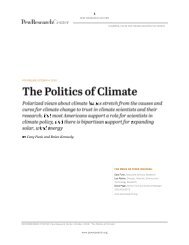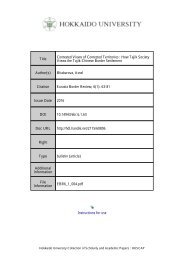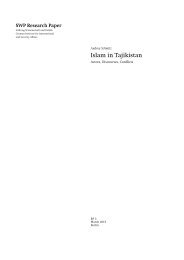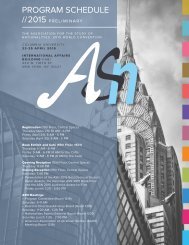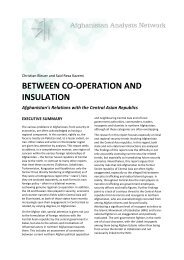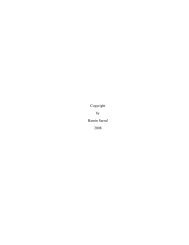Afghanistan in 2015 1
mM5Zmj
mM5Zmj
You also want an ePaper? Increase the reach of your titles
YUMPU automatically turns print PDFs into web optimized ePapers that Google loves.
10<br />
<strong>Afghanistan</strong> <strong>in</strong> <strong>2015</strong><br />
that the national government is do<strong>in</strong>g a good job has fallen from 75.3% <strong>in</strong> 2014 to 57.8% <strong>in</strong><br />
<strong>2015</strong>. Satisfaction with the performance of prov<strong>in</strong>cial, municipal, and district governments has<br />
also decl<strong>in</strong>ed. The percentage of Afghans who say the municipal government is do<strong>in</strong>g a good job<br />
decreased from 61.0% <strong>in</strong> 2014 to 47.2% <strong>in</strong> <strong>2015</strong>, a record low. Reported confidence <strong>in</strong> various<br />
public officials also decreased. Afghans report less confidence <strong>in</strong> parliament this year (42.4%)<br />
compared to last year (51.0%), and also less confidence <strong>in</strong> their own member of parliament (from<br />
51.5% <strong>in</strong> 2014 to 42.9% <strong>in</strong> <strong>2015</strong>). By comparison, confidence <strong>in</strong> the media (66.6%) and <strong>in</strong><br />
religious leaders (64.3%) is much higher.<br />
• Electoral <strong>in</strong>stitutions. Confidence <strong>in</strong> the Independent Election Commission dropped nearly <strong>in</strong><br />
half over the past year, from 66.4% <strong>in</strong> 2014 to 36.4% <strong>in</strong> <strong>2015</strong>. The 2014 survey was conducted<br />
prior to the 2014 presidential election results and ensu<strong>in</strong>g ballot recount, and before the National<br />
Unity Government was formed. Reported confidence <strong>in</strong> the Independent Electoral Compla<strong>in</strong>ts<br />
Commission (IECC) is even lower (34.7%). Confidence <strong>in</strong> the IECC is slightly higher among<br />
rural (38.3%) compared to urban (30.1%) respondents.<br />
• Corruption. Despite government efforts to curb corruption, 89.9% of Afghans say that corruption<br />
is a problem <strong>in</strong> their daily lives, the highest percentage reported <strong>in</strong> a decade, with 61.1% say<strong>in</strong>g<br />
it is a major problem and 28.8% say<strong>in</strong>g it is a m<strong>in</strong>or problem. Helmand (84.8%) and Kabul<br />
(81.3%) are the two prov<strong>in</strong>ces where the highest proportion of residents say that corruption is a<br />
major problem, and Panjshir (11.0%) is the lowest. This year, over half (53.3%) of Afghans who<br />
had contact with police with<strong>in</strong> the past year say they paid a bribe, up from 45.1% <strong>in</strong> 2014 and<br />
exceed<strong>in</strong>g the previous high of 53.4% <strong>in</strong> 2011. The frequency of bribes paid to officials <strong>in</strong> the<br />
municipality/district office (66.0%), the judiciary and courts (63.4%), customs office (61.2%),<br />
prov<strong>in</strong>cial governor’s office (60.9%), when apply<strong>in</strong>g for a job (58.7%), state electricity supply<br />
(54.9%), ANP (53.3%), public health services (52.6%), ANA (43.2%), and admissions to school/<br />
university (43.0%) all rose <strong>in</strong> <strong>2015</strong>.<br />
• Dispute resolution. S<strong>in</strong>ce 2007 there has been a slow but steady <strong>in</strong>crease <strong>in</strong> the reported usage<br />
of state courts for dispute resolution services. However, Afghans approach a range of formal and<br />
<strong>in</strong>formal actors for dispute resolution, depend<strong>in</strong>g upon the dispute or problem. For problems<br />
<strong>in</strong>volv<strong>in</strong>g land or water, respondents most frequently say they would go to local elders of the<br />
shura (47.0% and 24.4% of respondents, respectively). For family problems, they most frequently<br />
say they would ask friends and family for assistance (29.9% of respondents). For problems with<br />
healthcare, respondents most frequently say would approach formal authorities, with 30.3% cit<strong>in</strong>g<br />
government departments and 10.5% say<strong>in</strong>g the district authorities. This year 21.5% of respondents<br />
had a dispute or formal case that they could not resolve <strong>in</strong>ternally and had to take to the Huquq<br />
Department or a shura/jirga. The most prevalent type of case was a dispute over land (42.2%),<br />
followed by family problems (16.7%).



